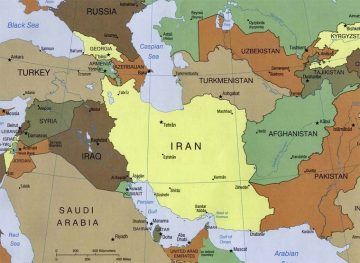Azareen Van der Vliet Oloomi in the LARB:
 On September 24, 2019, in his UN address President Trump defended the United States’s economic sanctions against Iran by invoking language that has become so familiar to us we fail to hear its ruthless and genocidal resonances. After stating that it was his duty and priority to “defend America’s interests,” Trump cited “Iran’s blood-lust,” its “menacing behavior,” its “traffic in monstrous antisemitism,” and accused Iran of single-handedly destabilizing the Middle East. The use of abstract and degrading terminology to discuss Iran has a long history in American politics: in 1987, during a televised address in reference to the Iran–Contra Affair, Ronald Reagan innocently stated that “what began as a strategic opening to Iran deteriorated, in its implementation, into trading arms for hostages” (it’s important to note that Jimmy Carter had lost the reelection to Reagan because he was devoted to the Middle East Peace Process and unwilling, in his own words, to “wipe Iran off the map”); in 1989, George H.W. Bush claimed that “we can’t have normalized relations with a state that’s branded a terrorist state”; and, during his State of the Union address months after the ghastly and apocalyptic 9/11 attacks, George Bush stated that “Iran aggressively pursues weapons of mass destruction and exports terror,” and that “states like these [Iran, Iraq and North Korea] and their terrorist allies constitute an axis of evil arming to threaten the peace of the world by seeking weapons of mass destruction posing a grave and growing danger.” This appeal to nationalist discourse has served time and again to justify the imposition of American will over Iran.
On September 24, 2019, in his UN address President Trump defended the United States’s economic sanctions against Iran by invoking language that has become so familiar to us we fail to hear its ruthless and genocidal resonances. After stating that it was his duty and priority to “defend America’s interests,” Trump cited “Iran’s blood-lust,” its “menacing behavior,” its “traffic in monstrous antisemitism,” and accused Iran of single-handedly destabilizing the Middle East. The use of abstract and degrading terminology to discuss Iran has a long history in American politics: in 1987, during a televised address in reference to the Iran–Contra Affair, Ronald Reagan innocently stated that “what began as a strategic opening to Iran deteriorated, in its implementation, into trading arms for hostages” (it’s important to note that Jimmy Carter had lost the reelection to Reagan because he was devoted to the Middle East Peace Process and unwilling, in his own words, to “wipe Iran off the map”); in 1989, George H.W. Bush claimed that “we can’t have normalized relations with a state that’s branded a terrorist state”; and, during his State of the Union address months after the ghastly and apocalyptic 9/11 attacks, George Bush stated that “Iran aggressively pursues weapons of mass destruction and exports terror,” and that “states like these [Iran, Iraq and North Korea] and their terrorist allies constitute an axis of evil arming to threaten the peace of the world by seeking weapons of mass destruction posing a grave and growing danger.” This appeal to nationalist discourse has served time and again to justify the imposition of American will over Iran.
More here.
